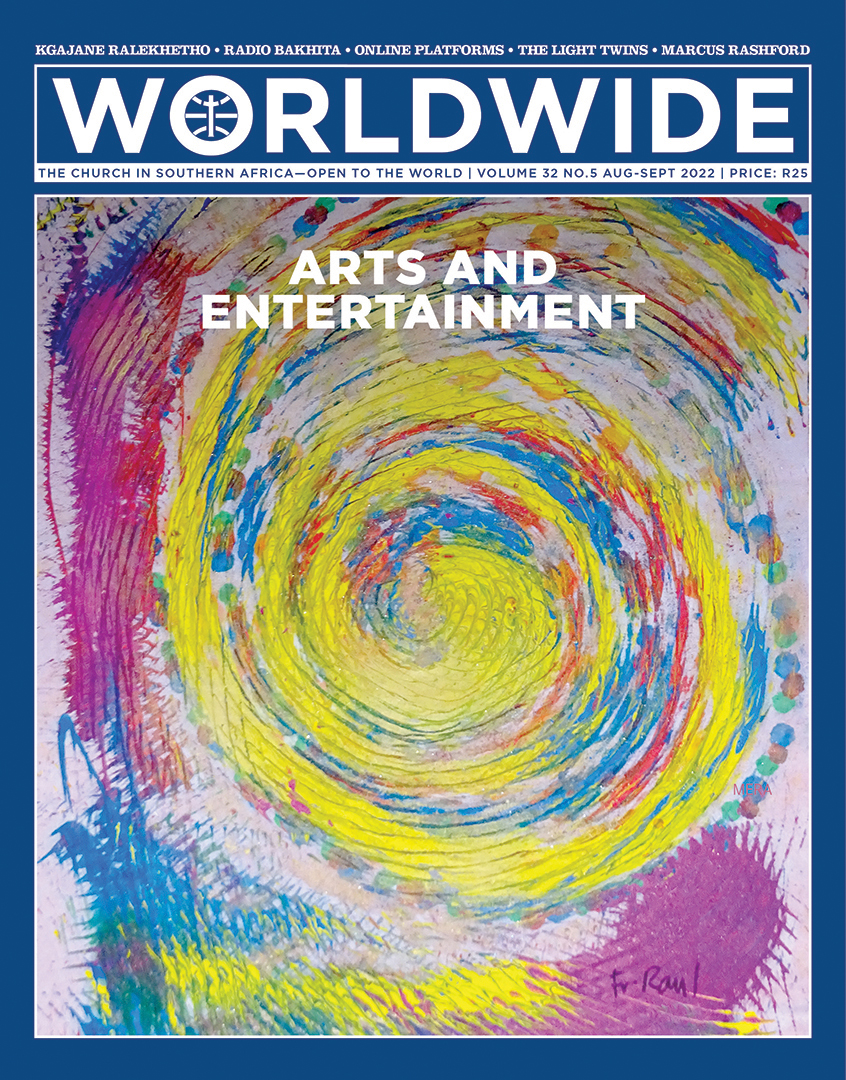
ARTS AND ENTERTAINMENT
This painting represents the turmoil experienced during a time of crisis. Typhoon is a symbol of anxiety, chaos, destruction and struggle. However, once those trial moments are surmounted, the inner energy of the typhoon brings transformation, putting life in order and strengthening one’s spirit. Emotional typhoon seems to tear life apart when it hits. One can’t turn away from it, but once it is over, it brings new potential; visions become clear and one sees brighter days ahead.
PAINTING BY FR RAUL TABARANZA MCCJ
FEATURES • CONTEMPORARY GOSPEL

Connecting people to God through music
Twins, Lesedi and Lebone Khunou, are Catholic Gospel artists who are passionate about communicating a message of faith and hope to their audience, through contemporary Gospel songs
BY Jill Williams and Rafael Armada | MCCJ
Q: Who are The Light Twins?
Lesedi (LS): Our names, Lesedi and Lebone, both mean “light”, in our Sesotho language. We always felt the need to bring the light of Christ to other people, whether through music or prayer. We grew up at St Hubert Parish, in Alexandra where we were members of the Youth Choir from the age of 10. When we sang, many women would come to us saying ‘I really felt God’s presence!’. It was then that I realised that what we had was something profound and different. Later on, at the age of 26, we decided to go beyond the walls of the Catholic Church at St Hubert, taking this ministry on and preaching the Gospel of God to the greater Church.
Wherever we go, there is a light that follows us, for people to come closer to God because of us. What God has called us to be, The Light Twins, is such a powerful witness!
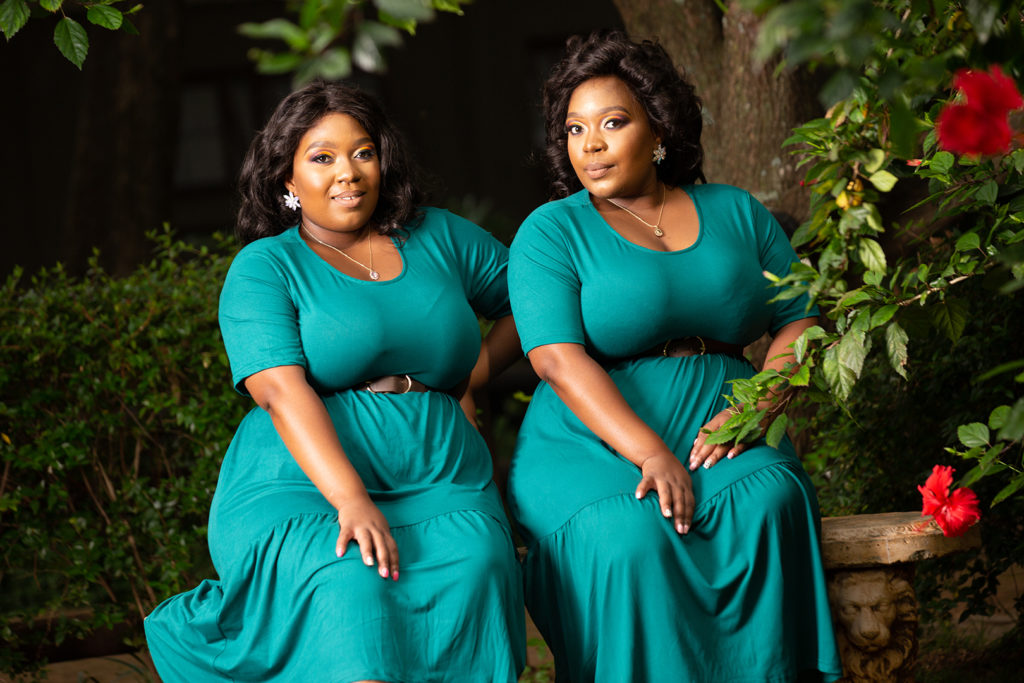
Q: What is ‘Contemporary Gospel’ to you?
Lebone (LB): Where we come from, Gospel is a very traditional genre and Catholicism is a very traditional religion. ‘Contemporary Gospel’ is fusing secular and contemporary pop sounds with the Gospel, which is traditional.
Q: Where do you get the inspiration for the messages in your songs?
LB: Our inspiration always comes from God; what God speaks through people, though not necessarily in a literal voice. That is how we normally know that God wants us to sing a specific song. In 2017, we released an album titled, Filled with hope. God was speaking to us through people. Over the years, we have been releasing individual songs not necessarily based on any specific liturgical period, but on what we were inspired to create at that time.
There is something about our Catholic teachings and hymns that is needed in the greater world and we are here teaching people about the message of God through our music
LS: Our first and most popular song, “O tla ntshedisa” (2017), has a chorus taken from a Catholic hymn. We expanded it adding what it means to us: God’s comfort. Although we weren’t going through hardships at that time, people would come to us and say that that song helped them to get through difficult periods, such as the loss of loved ones. In 2021, we lost our aunt to COVID-19, and we sang at her funeral. We cried through most of it! Then we understood what people meant when they said that the song had carried them through hardships. God spoke to us at a time when we didn’t even know we would need that song.
Q: Does it often happen that you sing a song and later you realise that it was actually meant for you more than for the people you were singing to?
LB: It happens quite frequently. We released a song recently which we had posted three years ago. It’s a song that we have been singing throughout our lives but only now, after COVID-19, it had a great impact and went viral on social media. The lyrics translated say, All who thirst, come to Christ! I now have a deeper understanding of what the song means.
Q: When you visit a parish, do you integrate your songs into the liturgy?
LS: There is one song of ours, in particular, that is a medley of communion hymns. Whether we can play it or sing it at Mass, depends on the circumstances. We have music that incorporates the liturgy of the Church. We visited a lot of parishes before lockdown and we sang our songs. It was amazing!
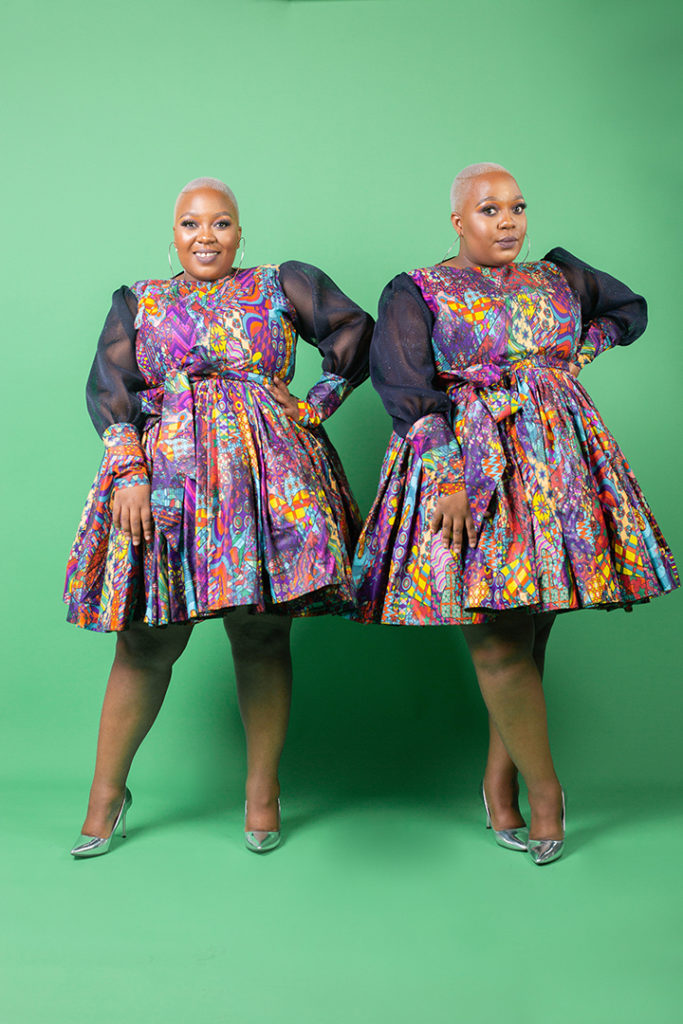
Q: At other Christian churches, such as Christian Revival Church or Hillsong, there are either large groups or one-person leading worship. In your opinion, is there room for it in the Catholic Church or is our current choir type more appropriate?
LB: There is power in both! Choirs and the singular worship movement of Hillsong-type churches are both essential. They play a different role and move the soul in a different way. In terms of the structure of the Mass, it has the capacity to accommodate both. A worship team or a single person can be used during communion or collection times, versus the moment of the Kyrie and Gloria. It would require a shift in mind-set because the Church is not used to that type of sound and one can risk creating the perception that one wants to do a solo, or be a diva during the liturgy.
LS: At the end of the day, it is about connecting people to God through music; whether it is the Hillsong route or the choir route. At St Hubert, we have played both roles, not only because we had the instruments, but also had songs where one person could lead. It depends on the structure and how you go about doing it, but there is room for implementing anything that brings one closer to God.
Q: Are you ‘accepted’ outside the Church?
LS: The reception has been amazing. We actually have a song called Kwake kwathi, speaking about the Annunciation to Mary by Angel Gabriel. We released that song in 2017 and it is loved by people who aren’t even Catholics. This showed us that there is something about our Catholic teachings and hymns that is needed in the greater world and we are here teaching people about the message of God through our music.
The contemporary nature of our ministry speaks to people who are active members of the Church, to those struggling to return as well as to people who aren’t even church-goers. We need to draw people back to the Church, not only in a way that says ‘come back to Church’, but firstly says ‘come back to God!’.
Q: How do you evaluate social media and its influence on the youth? What is your opinion about the online contents of the industry in which you are involved?
LB: We come from a corporate background and always think of branding. We take that into our Catholicism and what we do on social media where you are your own brand. The various platforms have helped us to connect and reach people across the world. It has its pros, but the youth often forget that it does also have bad repercussions if misused. It all depends on the content you put out there. So, you can go viral for good or for bad things, it is your choice as a youth, how you want the world to receive you.
LS: Just as the Church saw the need of online platforms, especially during lockdown for Masses, we also used platforms to give people hope throughout the pandemic. We hosted rosary evenings daily. We called it “Rosary for an end to the Corona Virus.” We prayed with people and asked God and Mother Mary to intervene in the situation. Later, when we stopped, people would ask us to pick it up again. We can use social media in a positive way, to enrich people’s lives.
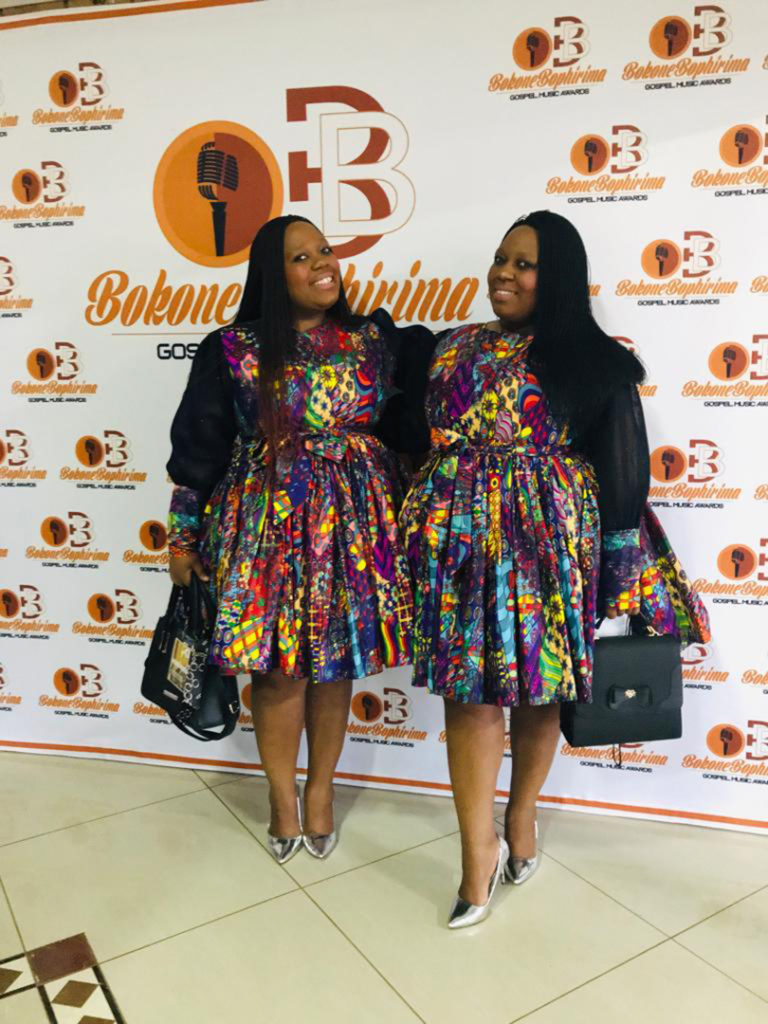
Credit: The Light Twins’ archives.
Q: What are your dreams as The Light Twins?
LS: Our names give weight to the calling that we have, which is to shine the light of Christ through our music and any form of ministry. Apart from that, we are also full-time workers. Lebone is in project management and I am in business management and communications. From a career point of view, our hope is to advance in our careers, to have our own businesses and to partner with many people, particularly in the fashion industry. For the ministry, we hope to sing for the Pope one day!
Q: What are the challenges you face on this journey?
LB: What we are doing in the Church is not really popular as people are used to choirs. We were among the first few solo-artists in our Church. In the Gospel industry, we are probably among the youngest. Gospel is often done by older people so, to get respect from the elders is tricky. The way we sound is also very different because we come from a Catholic background. We don’t raise our voices the way other singers do and, we can be perceived as not worshiping enough, because of that.
LS: We have received a lot of ridicule and criticism, with claims that we are trying to be Protestant, but all we try is to bring people closer to God. Sometimes people don’t hear our Catholic hymns despite them being so rich. It is like praying the Hail Mary and not paying attention to the words. We might not sing all eleven verses of a common hymn, but rather the three that touch us, singing them in a way that someone can really listen to and not just hear it.
Q: Do you collaborate with other musical groups?
LS: We have collaborated with a few other Catholic artists. Recently, we had The Music Extravaganza at Regina Mundi Catholic Church, in Soweto, to fundraise for the building of a Marian Shrine in the Archdiocese. We have also collaborated on a song with an artist from Pretoria Archdiocese. We featured a Catholic poet in one of our songs. We have worked with many artists. We have not yet had the opportunity to feature a choir, but we want to. We are also going to be featured in a song with a Hip Hop artist in the mainstream Gospel space.
Q: What impact do you think Catholic authored music and its specific sound makes in the Gospel industry and in the music industry at large?
LB: Because of the powerful lyrics and music we have as Catholics, we find Gospel artists from other denominations taking our hymns and making them their own. It’s time that we, Catholic artists, take our music, which has so much depth, to the world. We have so much to give.
LS: I think it’s also in the packaging. Our neighbour heard us sing and asked which Church we attend. We said that we were Catholics. She replied that we do not sound Catholic. As much as it was a compliment, it made me wonder, what does Catholic sound like? But it showed me that there was something that appealed to them. As Catholics, we need to package our music in a way that any person (who is not a Catholic) will be able to hear and understand.
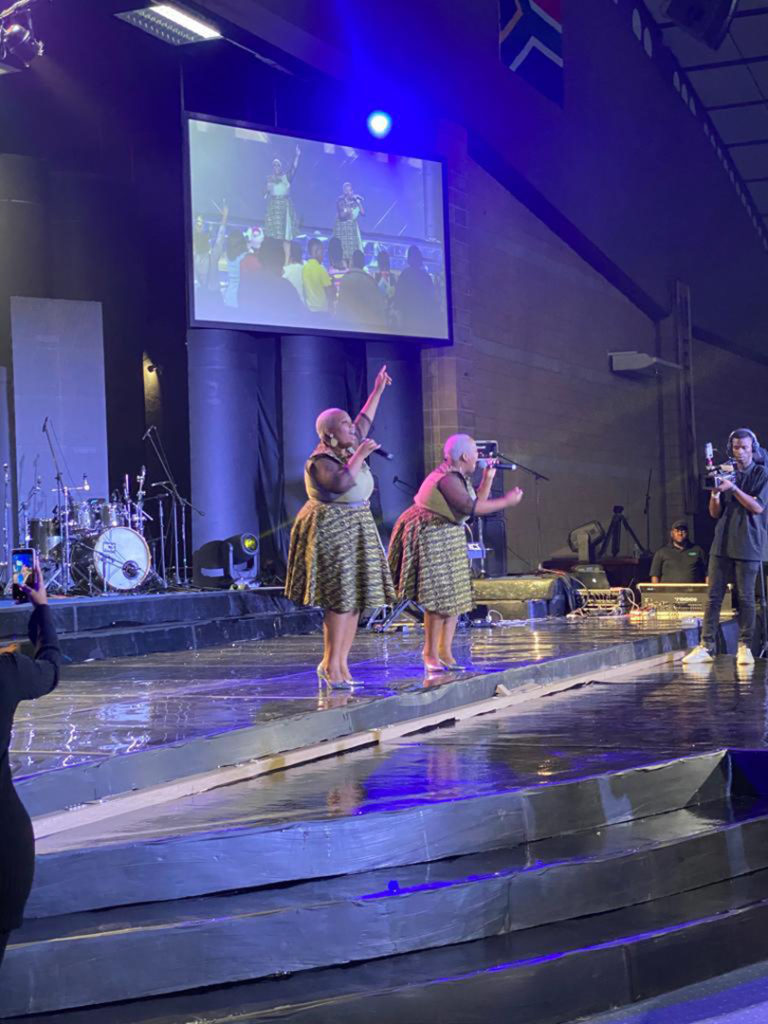
Dube and more. Credit: The Light Twins’ archives.
Q: Is your music addressed to the youth or to people of all ages?
LB: We are young and we try to make our music appealing to the young people. Fortunately, we have been able to get buy-in from the young people due to the sound we are ‘selling’, but adults are also drawn to our music. It is nice to know that we can speak to the youth and to the adults alike. When we perform on radio, people in our space always ask: ‘who is your target audience?’, our answer is that we don’t have one because we want to reach everyone. This is what makes our music quite unique, because it is not youth-orientated or adult-orientated.”
LS: Most of our supporters are older people. Whenever we are on Radio Veritas, all the people that call in are elderly. They love our music. We find that so amazing because if we get blessings from our elders, we know that God is blessing us.
LB: We are followers of the fourth Commandment, so when adults give you their stamp of approval, you know you are doing something right. It is just as touching when we go to a parish and twelve- or thirteen-year-old children tell us that they are inspired by our work and look up to us. We are making a positive impact on the youth.
LS: Their being inspired goes beyond trying to get into a solo act. Many are asking how to start a choir. The work that we do inspires people to do better for the Church as a whole.
Q: What support have you experienced from your Church or the community at large?
LB: We have been so blessed! Every time we knocked at parishes and ask to render some items, everybody opened their doors to us. We are also freely allowed to sell our CDs. In 2019, we had a launch and the bulk of the attendees were our parishioners. To know that we are supported at home is always beautiful.
LS: Another Catholic organisation that supports us is Radio Veritas. They play our music all the time. It helps us reach people we don’t usually reach, which is phenomenal. Beyond this, posting on social media is the kind of support that can be given to groups like ours. It greatly assists us to reach more people.
Q: How could the Church be more outreaching?
LB: People have to be ready to receive you before they are willing to share what you have to give. If you love our music, post it or share one of our songs with others.
LS: Online Mass has been working, and it is not only for lockdowns, but even for those who cannot attend church on Sundays. It can assist the Church to reach more people.
God used us as a vessel to give someone hope and faith
Q: What advice would you give to young people who are aspiring to do what you are doing?
LB: We always say ‘yes, you can!’ as Barack Obama said. A lot of people don’t believe in themselves. It’s so important to find your voice and niche. Everybody has something to offer. Our society often focuses on the negative and not on what people can actually do. We always tell the youth that they can make a difference in their family, community and church. We say, ‘Just get started and forget about the nay-sayers’.
LS: My advice would be to stay in your lane. There is something about being yourself. God called you for a reason. Someone once said: “It wasn’t a conference call when God called you”. That is what Lebone and I remind ourselves of when people ridicule and criticize the work we do. We rest in the fact that our fruits will follow us, and we always see the fruits. In a prayer session one lady said that after praying with us, her dad woke up from a coma. That was amazing! God used us as a vessel to give someone hope and faith. So, we already know that there is something we do that no one else can do. There is a reason why God called The Lights to do what they are doing and someone else to do what they do. So I say “stay in your lane and don’t compare yourself to other people because God made you to be you.” Even Lebone and I have different voices. She must play her role and I must play mine and God just makes magic.
| Dates To Remember |
|
August 9 – Women’s Day in South Africa 9 – International Day of the World’s Indigenous Peoples 12 – International Youth Day 21 – The Assumption of the Virgin Mother 21 – International Day of Remembrance and Tribute to the Victims of Terrorism 22 – International Day Commemorating the Victims of Religion or Belief Violence 23 – International Day for the Remembrance of the Slave Trade and Its Abolition 24 – Heritage Day in South Africa 29 – International Day against Nuclear Tests 31 – International Day for People of African Descent September 5 – International Day of Charity 7 – International Day of Clean Air for Blue Skies 8 – International Literacy Day 9 – St Peter Claver, patron of the missions 9 – International Day to Protect Education from Attack 12 – United Nations Day for South-South Co-operation 15 – International Day of Democracy 18 – International Equal Pay Day 21 – International Day of Peace 23 – International Day of Sign Languages 25 – World day of Prayer for migrants and refugees 26 – International Day for the Total Elimination of nuclear weapons 27 – World Tourism Day 28 – International Day for Universal Access to Information 29 – International Day of Awareness of Food Loss and Waste 30 – World Maritime Day |
